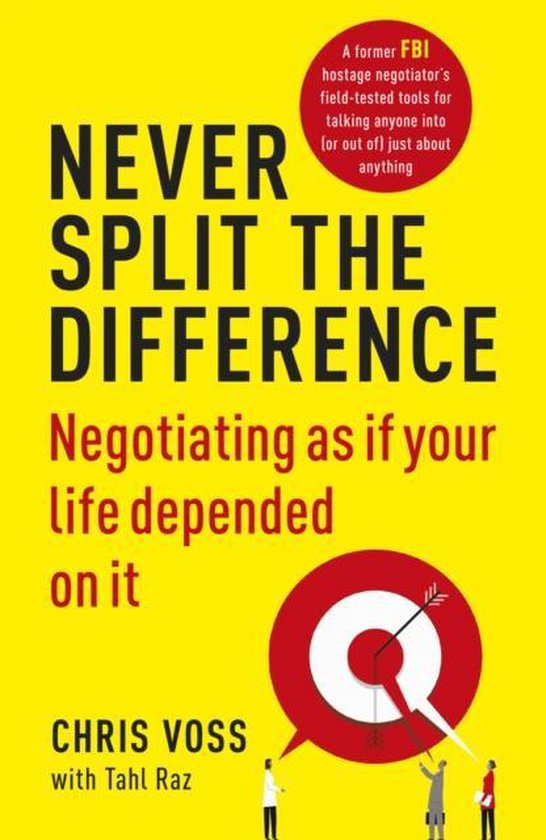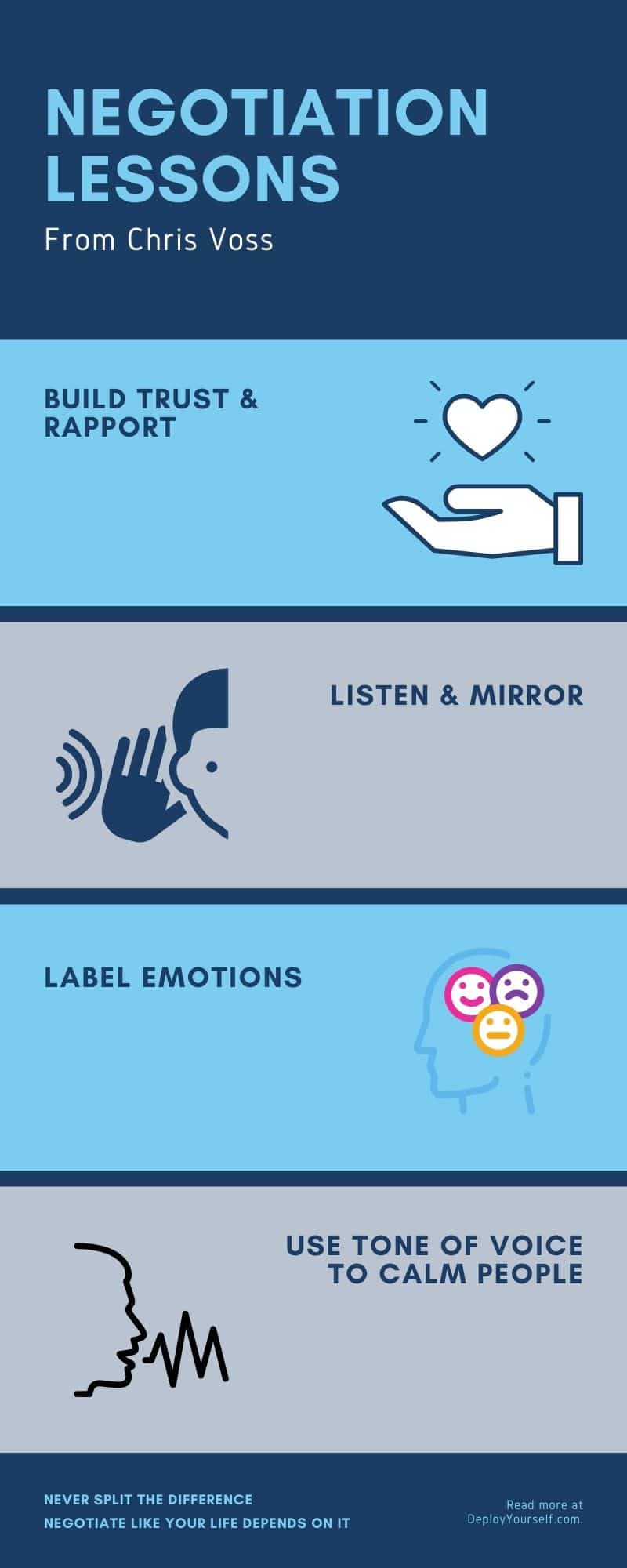Negotiations are everywhere. They don’t just take place in courtrooms and board rooms. Negotiations also take place when we want our children to spend less time watching TV or try to get a business partner to see our point of view. We are continuously negotiating in life.
Never Split The Difference (2016), authored by Chris Voss and Tahl Raz is extensively based on Chris Voss’s experience with negotiation in the FBI. The book highlights many practical skills one needs and can learn for successful negotiation in all walks of life.
What Is Negotiation?
Negotiation begins with wanting a desired specific outcome. When two or more people need something from each other, negotiation takes place. But how does one master negotiation and apply it to every aspect of life?
Convincing others and dealing with human emotions is an art that needs practicing and developing over time. It requires more than keen intellect, rationality, and logic. The challenge arises because human beings do not make decisions rationally. We are known to act spontaneously and unpredictably due to our primitive instincts and emotions.
Psychologist Daniel Kahneman’s and economist Amos Tversky’s extensive research found that (contrary to earlier belief stating that humans act in a rational manner and to their own advantage) humans are predisposed to cognitive biases, leading to subconscious irrationalism. They derived more than 150 biases that could affect negotiation abilities due to the complexity of the human mind.
In short, all of us make decisions and negotiate based on our emotions much more than we realize. That is why it is very difficult to negotiate with people using only the facts. Chris Voss shows us in his book that everyone, regardless of whether they are your colleague or a bank robber, has a human desire to be heard, to belong, and to feel safe and important.
Below are 5 of my biggest negotiation takeaways from the book :-
1. Build Trust & Rapport To Get Information
To be good at negotiation, one must be adept at procuring accurate information. Without having enough information about the opposite person or the situation, one is likely to lose. Moreover, new information can completely change the equation, therefore one must be able to process the new information and play their cards accordingly.

To gain more information, a negotiator must gain the opponent’s trust. This must be done tactfully by building rapport and getting the opposite person to divulge information through empathetic conversation rather than interrogative methods.
The author worked with 24 years with the FBI and was the main kidnapping negotiator for many of these years. Chris Voss discusses a 1993 bank hostage case where the robber fed them wrong information. He informed the police that he and four partners were in the bank, when in fact he was alone. His partners robbed an ATM, while he took the bank hostage and confused the police.
That’s why you need to establish rapport with your counterpart. One way to do that is to get the other party to talk a lot. As they do, you’ll be able to figure out what they want.
2. Listen, Mirror, Listen, Repeat
In negotiations, listening skills are essential. When one pays attention to what the opposing party is saying, it makes the opposite party feel important. Employing ‘active listening’ is important to show empathy and connect at a personal level.
A technique called mirroring (simply repeating what the person says but with an inquisitive tone) builds rapport. The opposite person feels a sense of importance and makes them feel that their needs are understood and this creates trust. Mirroring helps trust-building and getting vital information from the opponent that the negotiator can use to his advantage.
In the previous 1993 bank robbery case, when the robber divulged that his driver had bolted, the author kept mirroring to the robber, “Your driver was chased away?” This led the robber to divulge vital information that enabled Voss’ team and the NYPD to apprehend the driver, helping the case.
The adversary is not the person across the table; the adversary is the situation. — Chris Voss
3. Use Your Tone of Voice As A Tool
During negotiations, our tone of voice and body language plays a vital role. The tone of voice that a negotiator uses can determine and guide the direction in which the negotiation heads. Using a slow and soft, but deep voice (also known as the Late-night DJ Voice), seems reassuring to the opponent, and helps the opponent to calm down and in turn share titbits of information.
The author, while taking over the bank robbery case from his colleague used this voice to calm down the robber. It prevented the robber from getting unnerved by the change in negotiators and talk further.
However, different situations need different tones. Unlike negotiations with criminals, closer-to-home situations (like negotiating with a partner or children) require a playful and positive tone, that emanates an easy-going attitude, empathy, and encouragement. Smiling is an easy way to disarm the opponent and make any conversation more pleasant. When one smiles while talking, the pleasantness of the smile extends naturally to the tone.
4. Label Emotions To Force Empathy
A good negotiator understands that the opponent’s emotional state is valid and real for them, even if you don’t agree with it. Essentially, one should try to look at the situation from the perspective of the opponent with empathy. While one does not need to agree with the opponent, using the technique of labeling – telling the opponent the exact emotion they feel and that you understand them. Labeling builds trust and makes the other person listen and communicate better.
A classic example of labeling can be seen in a 1998 case, when four fugitives, armed, were hiding in an apartment. The author told them that he understood what they were feeling (afraid, scared) and understood their worry about going back to prison. After a few hours, the fugitives surrendered. Through labeling, the author had managed to calm them down enough to think about their situation rationally.
“Unexpressed negative emotions never die. They fester like an infection” — Chris Voss

5. Never Rush, Never Push People, Never Compromise
It is natural to want to reach the end of a negotiation soon. However, rushing through negotiations can result in clouded judgments and a dissatisfying result. When an opponent sets deadlines, good negotiators take their time, digging deeper for more information. It is crucial to remember that most deadlines are relatively random and flexible.
Negotiators should also avoid accepting a bad deal in haste and should never compromise. This is also known as splitting the difference. Often, deadlines and demands do not necessarily reflect the exact needs and thoughts of the opponent. Therefore, giving in or compromising might not always solve the issue at hand.
For example, if a kidnapper has taken a politician as a hostage and demanded a ransom, he might not necessarily be after money. If his intent is to make a political impact, there is no telling if compromising or accepting the terms will lead to release.
In conclusion…
One has to be patient during negotiations. The key is to understand the opponent’s needs, situation, and thought process. Negotiators should build trust and listen with empathy. They should use a calm yet empathetic tone to build trust. Finally, never compromise and split the difference, as there is usually a better way which can work for both parties better than the compromise.

Trackbacks/Pingbacks